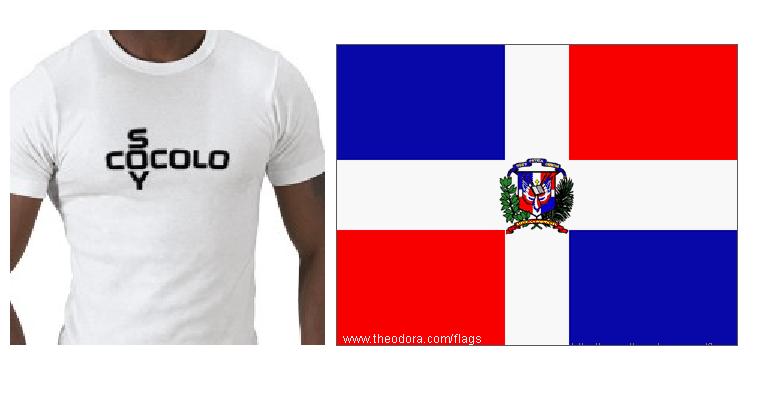Is Cocolo the Dominican N-Word?
From Dominican Chronicles Vol 12: “Cocolo By Claudio E. Cabrera
Two weeks ago, I was eating dinner with a group of neighborhood friends. One of my friends is Dominican and he was talking about the color issues amongst us.
We spoke for a bit and it was an interesting conversation. But he used one word that has puzzled me forever: ‘Cocolo.’
He said: ‘I’m a Cocolo.’
I didn’t really know how to react to it because he embraced the word and saw no issue with it. Plus, it was the first time I heard someone of my complexion call himself that (he’s actually a few shades lighter).
Throughout life, friends, family members and my own ears told me that word is offensive. I hear it at restaurants, on trains, and in barber shops when talking about someone who is Black. I’m sure some of my readers have heard it and either cringed or wondered what it meant.
Here is one definition I found online:
Now, whenever I hear the word it’s in two contexts – a bad one and a harmless/proud one.
‘Maldito Cocolo’ (Damn Black)
‘Eso cocolos me tienen cansao’ (I’m tired of Blacks)
Then its used in a way that doesn’t sound so harmful.
Que eres tu? Yo soy un cocolo (I’m a Black)
Que era el hombre? Un Cocolo. (He was Black)
From the definitions and examples I provided you, you’ll see that it can be used as a prideful word or perceived as a hateful one. Thing is, I’ve only heard one person say it in a prideful way my whole life. Most of the time I hear it, it’s used in a negative sentence.
One day, I pressed one of my friends about it and he said: ‘It’s not the N word. It’s just a way of calling people who are your complexion. Sort of like Gringo.’
I’ve never said Cocolo in my life (not once), but I have said Morenito to describe someone of my skin color whether Spanish speaking or not. I shouldn’t be using that word because it’s offensive in nature as well.
But Moreno lost its negative connotation with me. I’ve been called a ‘Morenito’ by my Grandma and others close to me. I never looked at the word Moreno as an offensive word because I felt it described people of my complexion – and I guess when I heard it – I heard it from people close to me so never took offense (wasn’t said in an offensive manner either).
Whenever they say it it’s: “Mi Moreno tan bello o mi Moreno tan buen mozo.” (Handsome/Beautiful)
But I’m here to say that both Cocolo and Moreno are both negative to me. Whether they are to you, is on you. But I’ve had Black friends and other Latino friends of my complexion ask me what I thought about it. My dad said he doesn’t accept Moreno or Cocolo now or when he was growing up in DR. He says call me a Negro. My Uncle let’s people call him Moreno all the time and doesn’t have an issue.
I just think if you’re Latino, you should call people ‘Negro’ which is the equivalent of Black. I would say ‘Afro-Americano,’ but some people are too lazy to say so many words.
I know this was a bit confusing, but it’s because it’s almost like the N word. Some Blacks say it to each other, but aren’t too fond of other races saying it. In most cases, cocolo is used to describe American Blacks. But what makes it extra confusing is that it’s used by Dominicans to describe other Dominicans or any other Black who is Latino.
This stuff gives me a headache and I’m sure it provides you with one too.
*Pops an Advil*
Have a good weekend…
Claudio E. Cabrera
is a 26 year-old award-winning writer based out of the Inwood (Northern Manhattan) section of New York City.
He’s a son of Dominican immigrants and graduate of Brooklyn College, which the Princeton Review recently coined “The Poor Man’s Harvard” in their 2008 Best Colleges Edition. Cabrera graduated in 2008 with a Bachelors Degree in Journalism.
In 2005, Cabrera began his journey in journalism. He’s written for community newspapers, daily’s, and magazines. He’s profiled the likes of Shaquille O’ Neal, Alonzo Mourning, Mayor Michael Bloomberg and Rev. Al Sharpton to name a few.



African. ..Just plain ole African would suffice……..
This is interesting! The descriptions of blackness are never ending.
I never took the term “morena” to be a bad thing. In fact, growing up I tried to use the term “negra” to describe myself and was told in no uncertain terms that I was morena (dark skinned) NOT negra (Black). Just like in America there are so many words to describe brown-skinned people and what offends who depends on the individual.
Thanks for bringing up this topic. I’ll definitely be sending this post to my friends.
PEACE,
Shay Olivarria
Author, 10 Things College Students Need to Know About Money
this aint really the real meaning of cocolo.who ever told u this either are wrong. cocolo doesnt have nothing to do with blacks people ok. before you public something be sure its truth. ok!
Actually cocolo is the right word to use. Cocolo is used for a black dominican (non Haitian.) Moreno would be inappropriate in Claudio’s case because his skin is dark brown. Moreno or trigueno is what most dominicans are. Darker dominicans are coloco’s.
I think that much of contemporaneous articles don’t have so many substantivepoints as this one. I look forward for the something more.
Cocolo is racist point blank period well the way most Dominicans use it anyway
Hi, I do think this is an excellent blog. I stumbledupon it 😉 I’m going to revisit yet again since i
have bookmarked it. Money and freedom is the best way to change,
may you be rich and continue to guide others.
Cocolo – It originally referred to Blacks that emigrated from English speaking islands to the Dominican Republic ….
I wanted to share a little bit of history behind this word (although I am still in the process of confirming it for myself and everyone else). But apparently since the Atlantic slave trade brought Africans to different parts of the Americas they were obviously used as slave labor, and property. Like any situation of oppression the oppressed will eventually lead a revolution in order to break free from their “chains”. Throughout almost every single Latin American country an uprising ensued, and usually by someone who had “leadership” qualities (former prince or king in Africa…I think of the character from the movie “Amistad”, Cinque… or someone who gained the people’s respect while enslaved). These revolutionary leaders were referred to as Cocolo, but at the moment I cannot say exactly why (this is where my research has brought me so far).
Like many words throughout history their definition changes, and it changes even more depending on the region of the world you are on. But if what I have learned so far is true then there is a positive connotation to the word, at least early on in history. Once I find out some more details and facts I will be sure to share it with you all. In the meantime here is a link to a documentary that was done by two excellent AfroLatinos that may shed some light to this, and other aspects of our history https://vimeo.com/channels/afrolatinos
The video is a clip of a documentary and it does not show it in its entirety.
I don’t understand how Moreno could be used as a derogatory term. Negro in most sentences sounds ugly. We tend to add to words to make it sound better…hense morenito, negrito. They sound better overall. Cocolo just means non spanish black person… hence Messiah’s song – Flow de cocolo (which litterally means I got the swag of a black man).
I’ve never heard the word cocolo used in a derogatory way – the examples that you gave above as negative had a negative adjective preceding the word – in the way that I can say “malditos santos” or “estos angeles me tienen cansao”. Cocolo is a very old word – used to refer to blacks of non-Hispanic or remnants of Taino heritage living in the Dominican Republic AND that spoke either English or French. In essence, making them culturally different from the blacks with African, Hispanic, and possibly Taino heritage that spoke Spanish. That’s it. That’s the beginning of the word. Cocolos are culturally different (though no less Dominican) because, through the years they’ve kept aspects of their culture – as an example, the cocolos in San Pedro de Macoris that still speak English regularly. It is no less different than the word construct Latino/Latina/Latinx used in the United States to refer to people with heritage from Hispanic and South American countries that are American but keep cultural customs from other countries. Obviously, like any word that has existed as long as cocolo has, it can be bastardized and misused and change its meaning (fags and gay and cool are all words that at one point were used to describe something entirely new and different and now can also be used in a derogatory/different way). With that last bit, I’d say that people are allowed to self-identify the best way they see fit: if your friend thinks of himself as cocolo, and he finds that fitting, then it works. I personally go for Afro-Caribbean, because I find that it describes my African, Spanish, Taino heritage, and Latinx because I am a Dominican-born American. Latinx don’t call people “Negro” BECAUSE THAT was the derogatory name for people who are black. Growing up “Negro” was one of the worst things one could call a person of color. That is the Latinx equivalent of the N-word, and the reason why seemingly always call people who are black, Moreno/a.
Well said Yazmin. Words like this have been bastardized and altered its meaning throughout time. You mentioned fag, and I thought of a time when an Englishman asked me for a “fag” when he saw me smoking a cigarette . My eyes popped open only to find out that it meant a match/light (or a cigarette itself). Just proof of how culturally, or regionally, words lose change in meaning.